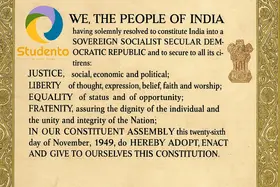

The Preamble of the Constitution of India stands as the philosophical foundation of our democratic system, defining the vision, values, and aspirations that guide the Indian nation. Through powerful words like Sovereign, Socialist, Secular, Democratic, Republic, Justice, Liberty, Equality, and Fraternity, it outlines the essence of India’s constitutional identity. For students preparing for competitive exams, understanding these key terms is essential to grasp the core ideals of the Indian Constitution and their evolution through important amendments and judicial interpretations.
It embodies the vision of the Constitution makers led by Dr. B. R. Ambedkar, capturing India’s journey toward sovereignty, justice, liberty, and equality. Each term within the Preamble represents a cornerstone of national identity and governance.
The following key terms of the Preamble represent India’s political ideals and social objectives as envisioned by the Constitution’s framers.
The word Sovereign signifies that India is an independent and autonomous nation, free from external control. It exercises absolute authority in all internal and external matters, symbolizing political freedom and self-determination.
The Socialist ideal promotes the elimination of inequality and establishment of a welfare state that guarantees social and economic justice. Though formally added by the 42nd Constitutional Amendment Act (1976), its spirit existed in the Directive Principles of State Policy.
The word Secular was officially added to the Preamble by the 42nd Constitutional Amendment (1976), though the concept already existed in the Constitution through Articles 25–28. It upholds the principle that the state treats all religions equally.
The term Democratic emphasizes popular sovereignty, meaning supreme power lies with the people of India. It reflects the will of citizens expressed through elections, participation, and representation.
The word Republic distinguishes India from monarchies, ensuring that the head of state is elected rather than hereditary. It affirms the people’s ultimate authority in governance.
The term Justice in the Preamble stands for equality in social, economic, and political spheres, ensuring fair treatment to all citizens. Inspired by the Russian Revolution (1917), it aims to create an equitable society.
Liberty ensures individuals enjoy freedom in thought, expression, belief, faith, and worship. These rights are protected under Fundamental Rights and balanced by reasonable constitutional restrictions.
The ideal of Equality guarantees equal treatment and opportunity for all citizens. It eliminates discrimination and promotes inclusiveness in civic, political, and economic domains.
The concept of Fraternity promotes a spirit of brotherhood, ensuring national unity and integrity. It binds citizens beyond differences of religion, language, or region.
The Preamble is the heart of the Indian Constitution, capturing the nation’s core values of sovereignty, socialism, secularism, democracy, republic, justice, liberty, equality, and fraternity. It not only guides governance but also inspires every citizen to uphold these ideals. For students and aspirants, mastering these concepts builds a strong foundation for understanding Indian polity and its constitutional philosophy.

Please login to comment and rate.